Podcast: Download (Duration: 51:02 — 41.7MB)
Subscribe: Spotify | TuneIn | RSS | More
I'm just back from the Independent Author Conference in Philadelphia. Here are some of my thoughts from the trip in this solo show: People don't buy books, publishing wide is more than just retail, tips for being a better publisher, strategy is what you DON'T do, plus, learn what you need for your stage of the author journey. (And yes, I am a distant relative of William Penn. Here's me by his memorial!)
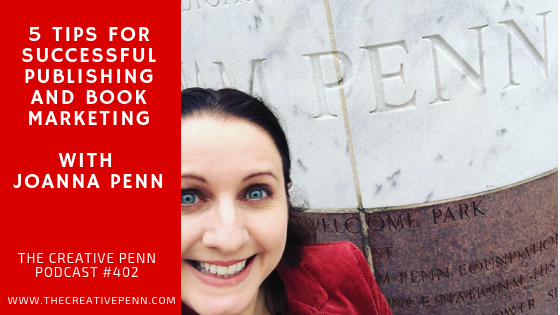
Plus, the world's first AI news anchor [Guardian], and I mention The Inevitable: Understanding the 12 Technological Forces That Will Shape Our Future by Kevin Kelly, AI Super-Powers: China, Silicon Valley and the New World Order by Kai-fu Lee, and This is Marketing: You Can't be Seen Until You Learn to See by Seth Godin.
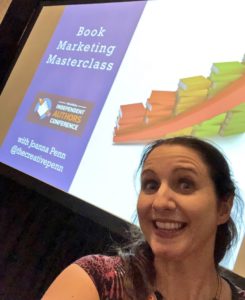
You can listen above or on iTunes or your favorite podcast app, read the notes and links below. Here are the highlights and full transcript below.
Show Notes
- People don't buy books. They buy entertainment, inspiration, or information.
- Publishing wide is more than just the online stores
- How to be a better publisher – making the most of what you already have
- Strategy is choosing what you DON'T do, as well as what you do
- Learn what you need for the stage of the journey you're at – or you will get overwhelmed
Happy writing!
5 Tips For Successful Publishing And Book Marketing
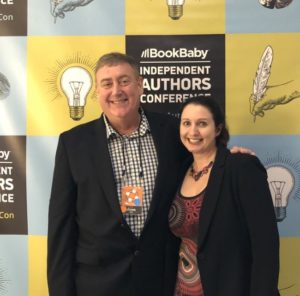
I’ve just got back from Philadelphia where I was speaking at the Independent Author’s Conference, run by BookBaby.
I also visited the Mutter Museum – one of the most famous anatomy museums in the world – and the reason I actually accepted the speaking event as I have wanted to go for years. If you’re into anatomy, it’s an incredible place. They also had a skeleton with the same disease I used in Valley of Dry Bones, which was cool – and if you’ve read Desecration, you know I love all that stuff.
A few things sparked for me during the conference sessions and also just being away and having time to think.
Tip: if you are struggling to focus or prioritize, then take some time out to think, rather than do.
Here are some of my thoughts.
(1) People don’t buy ‘books.’ They buy entertainment, information or inspiration.
They buy escape to another world on their commute to a job they don’t like.
They buy a way to change their life.
They buy an answer to a problem.
When you write, you are deep within yourself – as it should be. You are the artist. You are the creator.
But when you publish, you need to switch your head to that of the reader. We get a little obsessed with genres and keywords and formats and minutiae about the book. But we need to think more about the reader experience.
Why do they want to read?
To escape on an adventure.
To change their life and discover a new way of making a living.
To learn how to become a better parent, or manage money, or learn a skill – or more about themselves.
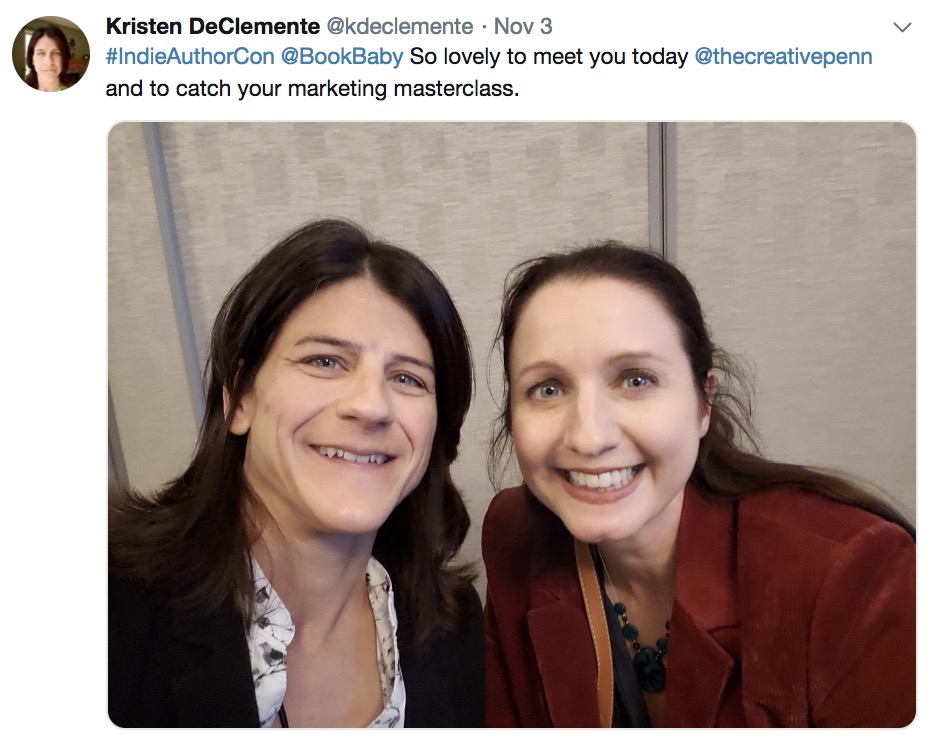
This is what you need to consider when you’re doing your back blurb and your ad copy – and generally your marketing head.
Why does someone really want your book?
When are they reading?
The rise of audiobooks and podcast listening has a lot to do with when people want to consume content. Everyone is busy and so listening while at the gym or doing chores or while driving to work means that people can learn/escape/be inspired while doing other things.
How can you position your book so that it answers what the reader really wants in a format that enables them to consume it?
(2) Publishing wide is more than just the online stores
I first heard of Brian Jud back when I started out in self-publishing in 2008. He talked about special sales, about selling in bulk to non-retail markets – and finally, I heard him speak at the BookBaby conference.
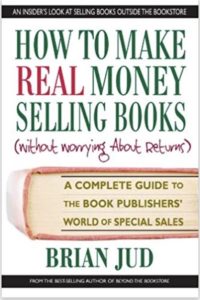
For example:
- Sell your book about pet care to pet stores, or to a dog food manufacturer to give away as lead generation for their business
- Sell your book on leadership direct to the military
- Sell your book about productivity in business to C-suite executives to give away to their employees
- Sell your book about getting a new job to universities, libraries, and prisons
- Sell your book on divorce to attorneys – as discussed with Honoree Corder in podcast episode 231
- Sell your novel with a theme of bullying to schools – as discussed with Dave Hendrickson in podcast episode 377
These kinds of bulk sales can generate significant revenue – but you will have to leave your ego at the door.
These sales won’t give you rankings or bestseller lists or screenprints next to famous authors, but you could make an entire year’s income from one print run. I find this business model fascinating, and it’s certainly something to consider if you have an appropriate book.
You can find out more in Brian’s book, How to Make Real Money Selling Books: A Complete Guide to the Book Publisher’s World of Special Sales.
(3) How to be a better publisher
The conference was all about publishing, as BookBaby provides premium publishing services to authors who don't want to do everything themselves. Some of the talks and exhibitors made me think about whether I am being a good publisher for my own books.
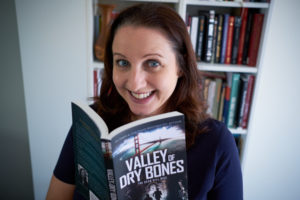
I think I do a decent job, but there is certainly more to do.
I'm 10 years into this journey, so I need to refresh my backlist. I'm slowly updating back matter and also putting my backlist into Large Print and Hardback editions.
These give me more streams of income from each book, plus they look great for comparison pricing against ebooks and audiobooks, as well as enabling me to advertise directly to print with Amazon Ads.
I'm also refreshing metadata for print. The Ingram Spark distribution system provides discoverability in many ways through databases that also pick up on keywords, so I’m making sure all my fields are optimized.
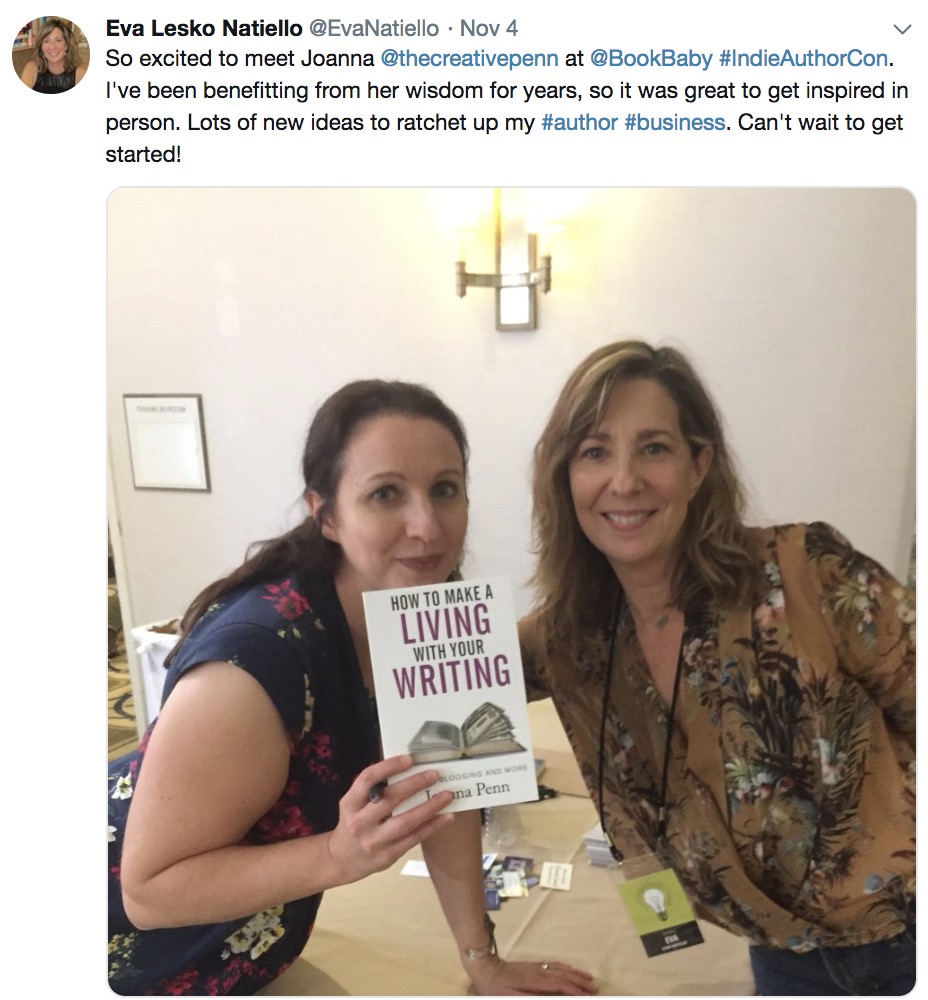
I’ve been selling direct for 10 years now.
I started out with e-junkie.com and then moved to SELZ, and now I see a better solution, so it's time to move. It’s important to consider how tools improve and change and then switch if you need to.
In the same way, I was with Aweber for years for my email list management and then moved to ConvertKit last year as a new solution offering much easier setup, management and I love them. [Tutorial here on how to set up your email list with ConvertKit.]
(4) Strategy is choosing what you DON’T do, as much as what you DO
There were a lot of sessions on various book marketing tactics at the conference, and the attendees went home with a massive list of what they could do to market their books.
Of course, there are myriad books, courses, blogs, and podcasts as well as events telling you what you should do. I’m responsible for a lot of that myself!
But as with Brian Jud’s talk above, you have to choose what you DON’T do, as well as what you do. You have to learn to say ‘no’ as well as say ‘yes’ or you will go mad!
I’ve started to keep a ‘not to do’ list to try and help myself with this, because I am guilty of doing too much and jumping on whatever interests me next.
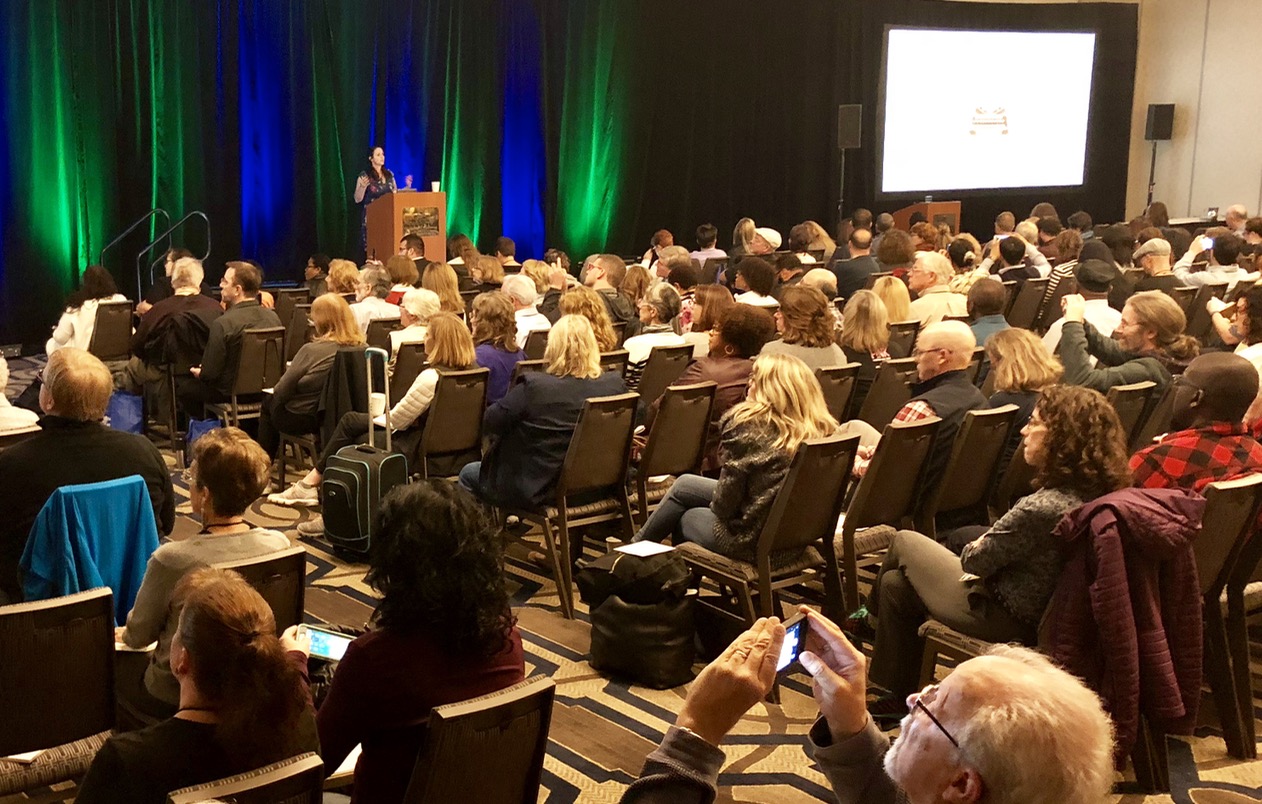
Speaking is a good example for me. For the first time in 10 years, I have no speaking events booked. BookBaby was the final one and that has been booked for a while. I have said no to so many things – I was tempted by a Caribbean cruise – but in the end, speaking has to go in my ‘not to do’ list at least for 2019.
2019 is my year of no professional speaking.
A year of fiction and content marketing for fiction – and wider travel as I have spent a lot of time in the US in the last few years. I’m excited to have just booked a cycle trip across Thailand, Cambodia and Vietnam for a year’s time – so healthy writer back in training!
(5) Learn what you need for your stage on the journey
My closing keynote was on How to Make a Living with your Writing, but the majority of the authors in the room were still working on their first book.
Many of them wanted to know how they should publish and market it and make money from the book before it even exists.
There is no simple answer to those questions – because if you haven’t finished a book, you haven’t got anything to publish or market. You may also learn a lot about yourself as you write it, and discover what works for you in terms of marketing.
You may also never finish that book.
Most writers who start books never finish them. Of course, you’re different. You’ll follow through. But don’t obsess about publishing or marketing until your book is in the hands of an editor and becoming something more than unfinished words on a page.
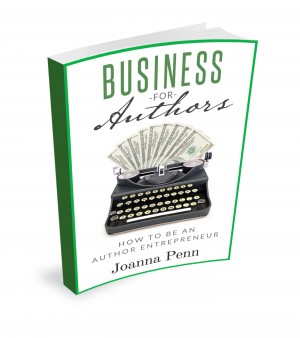
- Stage 1: “I want to write a book.” Challenges include learning craft, writing and finishing your book.
- Stage 2: “I am a new author.” Challenges include mindset issues and learning marketing, and also publishing if you go indie.
- Stage 3: “I am an established author.” Challenges include time management and making a decision whether you want to go full-time + marketing + mindset issues
- Stage 4: “I am the CEO of my creative business.” Challenges here are learning business skills, working with freelancers and VAs, time management.
Click here to read the article in more detail.
I hope you've found some of these ideas useful. Please do leave a question or comment below and join the conversation.
Happy publishing and book marketing!


It was a really good conference. One of the things I particularly liked was that there were things you could take away from it and do right away. I’m going to be a panelist at a SF con Thanksgiving weekend. So I thought I could put my last book on sale for free for the con, tell people it’s free and ask for reviews. We’ll see.
Thanks, Joanna, for a great overview on indie publishing. As a multi-published fiction and non-fiction (and adult coloring book) author I’m struggling right now with identifying what NOT to do, myself. It was a big deal for me to stop tweeting, for example. I’m enjoying learning more about what’s working in book marketing, thanks to you. Keep up the good work!
The ‘not to do’ list may well be far more important than the To Do list 🙂
Great post, great tips. You are grounding and inspiring at once, as always.
This was super helpful, as always, but the part that stood out to me was the ‘cycling trip’ because we live in Southern Thailand (close to Phuket) and we lived in Vietnam at one point, so you’re in for a treat!
Thank you 🙂
My books are about a guy who leaves the forces and becomes a hitman and bank robber… may be I can sell them to the MOD for them to give people who are being RIFd 😀
Finally had a chance to listen to this podcast, Joanna. Thanks for all the good tips. I especially enjoyed the reminder of the different stages of authorship. As an “established” author, I’m looking forward to upping my game in the year ahead and the future. So much to learn, but as you said (wisely!) it doesn’t all need to be done at once. The conference sounds like a lot of fun–hope to attend some year.
Glad you enjoyed it 🙂 We are definitely all progressing through the stages slowly – there’s no rush!
I like that this post mentioned that people often purchase books before of information or inspiration. You make an interesting point and my sister is looking to purchase a book about the African diaspora. I will definitely ask my sister to look for a reliable publisher about book recommendations.